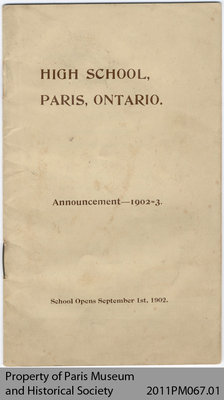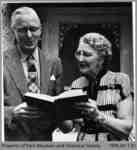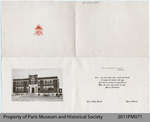HIGH SCHOOL, PARIS, ONTARIO.
Announcement—1902-3.
School Opens September 1st, 1902.
"LABOR OMNIA VINCIT."
High School
PARIS, ONT.
BOARD OF EDUCATION.
Chairman Rev. Canon Brown.
R. C. Macpherson, E. P. Watson, T. J. Murray, J. Harrison, G. Clump, R Thomson, F. Smoke, Dr. Dunton,
Sec.-Treas—Thomas McCosh. Principal High School—W. N. Bell, B.A.
J. M. Patterson, Rev.H.D. Silcox, J. S. Armitage, W. D. Daniel, A. Kirkpatrick, T. C. Munn.
SCHOOL OPENS—Sept. 1st, 1902. All pupils should be present on opening day. This facilitates organization and promotions.
TEACHING STAFF.
WALTER N. BEtilj, B. A., PRINCIPAL.
CLASSICS, GEUMAN, ENGLISH.
ROBERT WIG HTM AN. B. A.,
M, L. RUSH, B.A.,
Principal's Residence, Sec. -Treasurer's Office,
Washington St. Town Hall.
THE AIM
We strongly deprecate the view held by some that the High School exists to train pupils for the professions. OUR AIM is, by awakening their intelligence, by training their powers of observation and by strengthening their morals, to help boys and girls to their highest usefulness, whatever vocation they may afterwards chcose.
The largely increased attendance of the past two years, especially from trie County shows that the school is gaining in public confidence and in usefulness.
This Announcement is respectfully addressed to the parents and teachers of the Town of Paris and the County of Brant. The Board feel that there is no need of pupils going to other counties to obtain an education ; and that they can, with perfect confidence, invite and urge parents to send pup.Is to Paris, where they will receive a'^e.ition, assistance and encouragement in the prosecution of their studies and in the development of character. Any further information desired can be obtained by applying in person or by letter to the Principal.
Staff and Equipment.
The School is under a thoroughly competent and experienced staff of teachers.
The Individual Needs of pupils are kept in view as much as possible in the class instruction.
The Equipment of the scientific laboratory is complete, ample provision being made for experiments by the pupils.
Bi-Monthly Reports of progress are sent to parents or guardians,
The Principal desires perfect freedom of intercourse between parents and teachers, and particularly so where the progress of a pupil does not seem satisfactory.
No Tuition Fee is required of pupils whose parents or guardians are residents or qualified ratepayers of the town. Pupils from the County of Brant and other counties pay a fee of one dollar per month.
The Library of the school is well equip-ed with the best books of reference. Besides through the liberality of Mr. John Penman the pupils have the use of a carefully selected list of books in the Paris Public Library, free of cost.
Parents who are obliged to send their sons and daughters from home to receive an education will find Paris High School very desirable from an economical point of view. Every necessary accommodation may be obtained in private houses at firorn $2.25 to $3.00 per week. When parents or guardians wish it, the Principal will exercise a kindly surveillance over students and will assist them in selecting suitable boarding houses.
ENTRANCE MEDAL & SCHOLARSHIPS
Dr, Kelly, Public School Inspector for the County of Brant, offers annually a gold medal, to be awarded to the pupil who stands first at the Paris Entrance Examination.
Mr. John Penman has offered the following Scholarships to candidates at the Entrance Examination at the Paris High School. The conditions attached are below:
The first of $12 in cash, to be awarded to the pupil from a rural school who makes the highest total of marks.
The second of $8 in cash, to be awarded to the pupil from any school who makes the second highest total of marks'.
The third of $6 in cash, to be awarded to the pupil from any school who makes the third highest total of marks;
CONDITIONS.
1st—The winner of the Inspector's medal shall not be eligible for any of these scholarships.
2nd—Half of the value of the scholarships shall be payable on October 1st, and the other half on Feb. 1st, on the certificate of the Principal that the winner has become a bona fide pupil of the Paris High School.
3rd—In the event of any winner not fulfilling the conditions of the scholarship won by him, the scholarship shall revert to the candidate next eligible for the same, but in no case shall any candidate receive more than one of these scholarships.
Necessity of High School Education.
In this age of advancement a broader education than can be gained in the Public School is a necessity for boys and girls who are to be USEFUL in the highest sense.
In Agriculture the competition between the newer Provinces and Ontario has become so keen that mere industry no longer ensures success. The Ontario farmer never needed trained intelligence so much as he does to-day. The young man who looks forward to this noble and ennobling vocation should know something of Literature, of Chemistry, of Botany, of 'Physics, and of Mathematics After a High School course in such subjects he will no longer regard farming as an oecupation only, but as a science which calls for his highest efforts. If he desires more special preparation he should take a year or two in the Agricultural College, wh^re he will find that his High School work will exempt him from many classes lie would otherwise require to take, and will enable him to devote more time to special agricultural subjects.
The Mechanic too often exercises no more intelligence than the machine he uses. The way to become an intelligent mechanic is to train the intelligence scientifically. This is the aim of High School education, an aim which cannot be attained in the Public School course, because the pupil is usually too young to fully realize his intelligence.
In Business Life and the Professions the need of High School training is so well recognized as not to require enforcement. No business college course can make a man the best kind of merchant or business manager, because most of the time of such courses is taken up with the tools of office routine, such as, for example, typewriting. What is needed for success is INSIGHT, for which one has to go to History, Literature and Science.
PART II includes English Grammar and Rhetoric, Composition, Literature, Ancient History, Arithmetic and Mensuration, Algebra, Geometry, Physics and Latin, and one of the following: French, German, Greek, Chemistry,
A candidate who has already passed Part . I of Form IT, under the regulations of 1899, will not he required to take the papers in Arithmetic, English Grammar, and the obligatory Physics.
The subjects for pass Junior Matriculation shall be taken at one examination and shall be as follows : English Composition, English Literature, English Grammar, Algebra, Euclid, Arithmetic, History (British, Canadian and Ancient), Latin ' and any two of Greek, French, German, Experimental Science, (Physics and Chemistry.)
PRESCRIBED WORK FOR 1902*3 EVSLISH
IN
COMPOSITION : An essay, to which special importance Avill be attached, oil one of several themes set by the examiners. In order to pass in this subject, legible writing j correct spelling and punctuation, and proper construction of sentences are indispensable. The candidate should also give attention to the structure of the whole essay, the effective ordering of the thought, and the accurate employment of a good English vocabulary. About two pages of foolscap is suggested as the proper length for the essay ; but quality, not quantity, will be mainly regarded. One examination paper.
ORGANIZATION ©F THE
There are four forms or classes in the school. Beginning in Form I a pupil advances as rapidly as he is able to the higher forms in order.
SUBJECTS OFN STUDY.
FORM I— English Literature, Grammar and Composition ; British and Canadian History; Geography, Physical and Commercial ; Arithmetic and Algebra. Botany, Book-keeping and Drawing. Reading Latin is an optional subject. Pupils who can ttike a three or four years' course, especially those who look forward to teaching or other profession, are advised to take Latin.
FORM II— English Literature, Grammar and Composition (continued) ; British and Canadian History (continued); Arithmetic and Algebra (continued) ; Geometry, Physics, Latin (continued), French, German.
FORM III— English Literature and Composition (continued) ; Ancient History ; Algebra and Geometry (continued), Physics (continued), Chemistry ; Latin, Fiench and German ( cout in u ed ) .
FORM IV— English Literature and Composition ; Ancient History, British History, Physics, Latin. French, Geiman, Mathematics.
FOR 1903.
1
Junior Leaving Standing is obtained by passing parts I and II of the junior Leaving Examination. The parts may be taken separately in different years or together.
PART I for 1908 includes English Grammar, Arithmetic and Mensuration., Composition, History, Geography.
Pupils of Forms I or 11 may take this examination.
LITERATURE : Such questions only shall be set as may serve to test the candidate's familiarity with, and intelligent and appreciative comprehension of, the prescribed texts. The candidate will be expected to have memorized some of the finest passages. In addition to the questions on the prescribed selections, others shall beset on a "sight passage" to test the candidate's ability to interpret literature for himself.
One examination paper. The authors prescribed are :
Form III — Coleridge, The Ancient Mariner; Wordsworth, Selections; Shake-spsare, M 3roh int of Venice.
Form IV — Work from Form III and Shakespeare, As You Like It.
Form III — Selections in the new Fre:ich Grammar. Fenillet, le Village.
Form IV — Work of Form III and Fen il let, la Tulipe noire.
Form III — Selections in the new German Grammar. Leander, Traumeieien, pp. 45-90.
Form IV— Work of Form III and Baum-bach, der Schwiegersohn ; 1 1/, Er 1st nicht Eifersuchtig ; Wichert, Post Festum. LATIN.
Form III — Selections in the new Latin Grammar and Virgil, Aeneid II (1 — 505).
Form IV— Caesar Bellum Gallicum IV and V (chaps. 1—23).
Virgil, Aeneid II (1—505).
Horace Odes III, IV.
Cicero Pro lege Manilla, Pro Marcello. Philippic XIV.
TEXT BOOKS.
The following books of the High School series : Reader, English Grammar (new edition), English and Canadian History, Geography, Arithmetic, Algebra, Bookkeeping, Botany — Flora, Part II. No text book is required in drawing. Primary Latin Book.
Kiverside Literature Series- — Scott's Lady of the Lake ( No. 53 ), and Haw-thoiiieV, Biographical Stories (No. 10), Concise Imperial Dictionary.
KORM II.
The lollowing books of the High School series: Reader, English Grammar (new edition), English and. Canadian History, ^ntiimetic, Algebra, French Grammar, German Grammar, Physical Science (Parti), McKay's Geometry.
Riverside Literature Series — Goldsmith, The Deserted Village etc. (No. 68), and Longfellow, Evangeime (No. 1).
Concise Imperial Dictionary.
KOl^IVI III.
The following books of the High School series : McKay's Geometry, Algebra, French Grammar, German Grammar, Chemistry, Physical Science (Part II). Myer's Ancient History, Primary Latin Book. Any edition of the prescribed texts in English and Mo Jerri Languages. Concise Imperial Dictionary.
iv.
For Part I — Hall and Knight's Algebra, Todhunter's Trigonometry, Green's History.
For Part ll — Any edition of the prescribed texts in English and Foreign languages.
Higii School Physical Science Part II and .supplement. Concise Imperial Dictionary.
Departmental Exam in ations 1902.
PART I.—Junior Leaving
Charles Brown Edward Daniel Clifford Elkington Grace Inksater Nelson Robson
Glenmorris
Eddie Silcox Basil Smith Lana Taylor Earl Taylor
Gertie Fleming (honors) Glenmorris
PART I. —Junior Matriculation.
Charles Buckley
Charles Carrie (except Gram.)
Andrew McRae (with Physics)
John McRuer (with Physics)
Margaret O'Brien
Harner Qua (with Physics)
Kenneth Watson
Clarence Whit by
Obtained Part I Matriculation standing on Part I. Junior Leaving Examination : Edna Nagle Harry Gray
Wm. Morrow Gordon Burns
PART II.—Matriculation.
Olive Armstrong (3 subjects) Roberta Graham Ernest Kay (except French authors and Algebra) Annie Qua
PART II. —Junior Leaving.
Annie Qua
PART II.-Senior Leaving.
Bertha W. Robson Morley E. Wilson
ENTRANTS OF 1902.
Names appear in alphabetical order.
Annie Bauslaugh, Mabel Broomtield, Carrie Burrill, Jessie Clarke, Margarite Crookes, Jennie Fasken, Gertrude Fawcett, Kathleen Foley, Jeanie Guthrie, Edna Kay, Lizzie Kelly, Pearl Kennedy, Frances Maus, Laurie Maus, Nina Muma, Olivet Patterson, Annie Reynolds, Estella Robinson, Augusta Rudolph, Nellie Sinclair, Jennie Stewart, Ethel Stewart, Gladys Stewart Jones, Edna Ten-nant, Edna Walker, Ida Wheeler, Pearl Williams, Jessie Wilson, Mary Woolman.
BOYS.
Geo. Bauslaugh, Geo. Bosworth, Wm. Cavan, Robert Cale, Geo. Folsetter, T. H. Gillies, Wylie Guthrie, Freeman Henderson, Geo. Henderson, G.o Inksater, Howard Inksater, Geo. Lee, Alan R. Miller, Thomas Newell, Thomas O'Brien, John Patterson, Norman Qua, Richard Rayner, Andrew Sinclair, Austin C. Stanton, Nelson Strickland, Kenneth Tennant, Robert Watson,
fledal and Scholarships.
Inspector Kelly's Medal, Nelson Strickland.
1st Penman Scholarship $12 (open to county pupils
only), Frances Maus, South Dumfries. 2nd Penman Scholarship $8.00 (open to all),
Agnes Laurie Maus, South Dumfries. 3rd Penman Scholarship, $6.00 (open to all),
Robert Cale, Paris.




